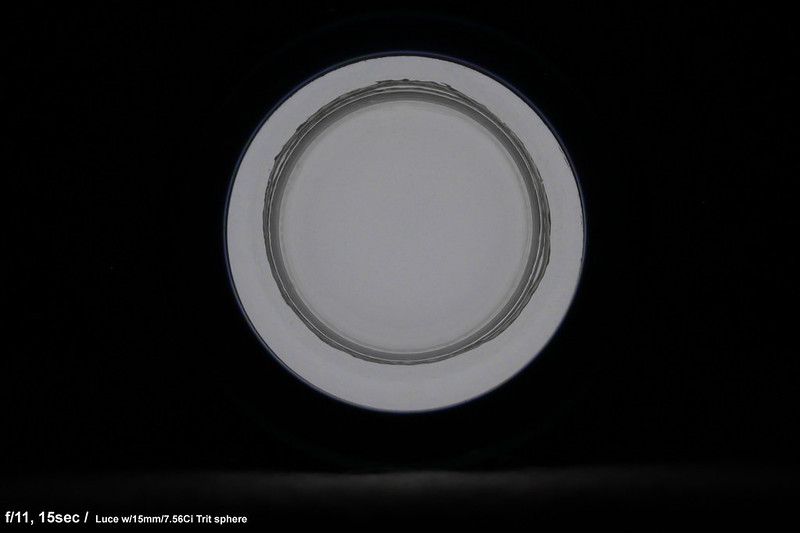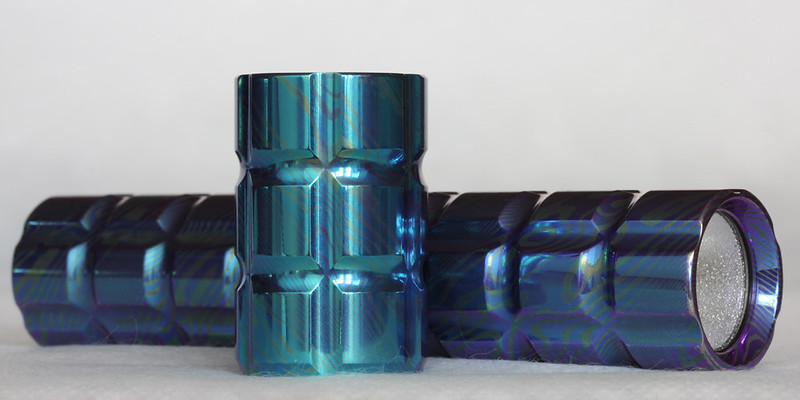Luce in the Sky with Diamonds ...ah, make that Tritium
LST
LSD is some nasty stuff - and heck, it doesn't even glow (but maybe you will if you mess with that stuff). No, I much rather prefer some LST...
Luce in the Sky with Tritium... a.k.a.
Photon Fanatic's Luce De Notte  Luce de Notte
Luce de Notte
The Luce has been around for quite some time and if you happen to hang out over at CPF, neither Fred not the Luce are new to you. Having made many exotic flashlights, Fred was looking for a new challenge. Having obtained a few Tritium spheres, Fred got the idea to use such a sphere to "power" a small host, inspired by the modern flashlight, using the light's reflector, glass, and similar host. Needless to say, the concept was a big hit and many a Luce was made for awaiting fans. Be sure to stop by his Luce thread -the variety of Luci (pl.) is just amazing - aluminum, titanium, bronze, polished, brushed, matte, straight or anodized, with ridges / dimples / etc. as well as
strategically capped with a polycarbonate dome/ disc that glows... :evil:
Tritium
I guess 99.5% of USN members not only know what
Tritium is, but own it in some form or other. Maybe you have a "trit" vial embedded in a bead, in a knife, on a flashlight, etc. Fewer are maybe aware that there are also larger vials as well as spheres!
Tritium, a radioactive isotope, replaced radium way-back-when in areas such as horology (watches); first as a paste/paint (but replaced by phosphor-based products like LumiNova) and then in a gaseous state stored in vials. Tritium has a half life of about 12.5 years and is essentially "effective" for about
six years before it is deemed too dim for practical use. A bit short compared to radium's half-life of like 1600 years, but considerably longer than the average button-cell battery...

Fred's Luci are designed to use either 18mm or 15mm spheres readily available on the grey market (read: CPF Marketplace). There may be a real need for spherical containers vs. vials, not sure what for, but one thing I know, the quantity of trit varies dramatically. For example, your typical 5x1.5mm trit comes in at 21 mCi (Ci =
Curie) while the 15mm sphere used in this particular Luce has a whopping 7.6Ci! That's roughly a 360% increase...
Of course, quantity is only one part of the equation; the human eye is more sensitive to certain colors than others, green being at the top of the list. From a chart, the white tritium used for this Luce has roughly 60% of the apparent brightness of green:
80% -> yellow
60% ->
white, [ice] blue
40% -> orange
20% -> red
15% -> [deep] blue
I chose white for two reasons; to stay neutral to the beautiful colors of the host and because, well, it is (was) the only color available in the 15mm spheres..

The only other alternative imho would have been
ice-blue, which would have had the same apparent brightness.
Luce de Nightstand
So what does one get when one combines a
*replaceable* 15/18mm trit sphere, a flashlight reflector & glass in a killer hosted-by-Photon-Fanatic package? One damn cool-looking... er, gizmo / gadget / coffee-table-conversation-piece / somewhat functional nightstand nite-lite! As for the last bit, well I think you need to aim for an 18mm green sphere, because anything short of that won't really light up much. But it truly is a cool little light - and to think it will remain on for about seven years...
aweeesooome  Arteest Extraordinaire!
Arteest Extraordinaire!
Fred churned out an awesome host with the same cool style, quality and refinement that I enjoy from his Block Party. The machining and anodizing is superb, the anodized primary colors morphing into
"interference" colors as you move the Luce around in your hand... mesmerizing. Whatever Fred touches proverbially turns to gold, I-kid-you-not.
:beer:
Along with the Block Party...
Effective brightness...
An ghostly glow from the [polycarb] tail... boo!













